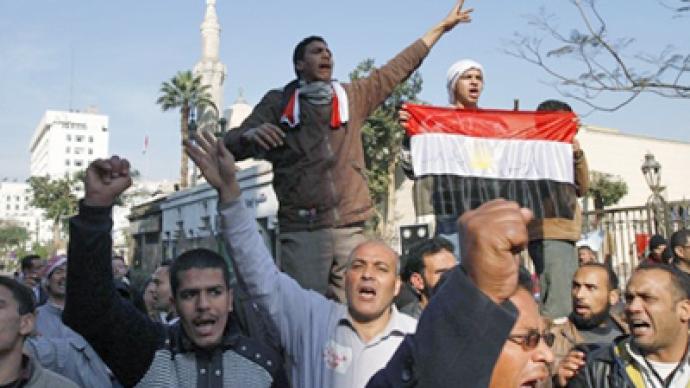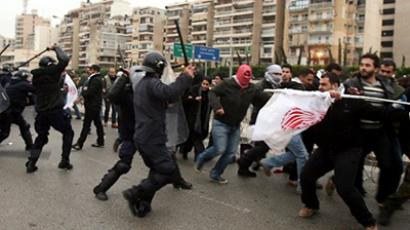Egyptians surround parliament, blocking politicians’ work

Hundreds of protesters have rallied in front of the parliament in Cairo, demanding that the newly-appointed lawmakers resign immediately.
Protesters say they did not want the ruling party to come to work, because they did not choose that parliament. Now they claim that all country’s government should resign, not just the president, AFP news agency reports.Demonstrators spent the night sleeping on the ground in a bid to prevent the lawmakers from entering the parliament.Massive protests in Egypt have not ceased for more than two weeks now. On February 8, the demonstrators on Tahrir Square rejected all the concessions the government had agreed to make. The one-and-a-half million people that again gathered on the square were calling for Mubarak to resign and for the profound democratic changes to be implemented in the country.The demonstrators keep insisting they will not calm down unless these two demands are fulfilled. They have planned another million-strong march for Friday.
In an exclusive interview, RT spoke to the Secretary-General of the Arab League, Amr Mohammed Moussa, who says that the unrest in Egypt is just the beginning of region-wide upheaval:“The Arab world is in a state of change, in the mood of change, with different degrees of change and different interpretations of the word ‘change’. But in general, at the end of the day, it is a change.”“Everybody is feeling the effect of these demonstrations,” he continued. “As I told you, it is a major event in the history of Egypt, perhaps not only of Egypt – in the history of nations. It is an uprising of the people and by the people. It is new in this part of the world. It happened in some countries before, but not to this intensity.”
There have been reports of massive strikes beginning throughout the country, with people putting forward political and economic claims. In particular, several workers at the Suez Canal have gone on strike. However, transportation through the major Egyptian transit route is continuing as normal.The unrest in Egypt has been caused by rising food prices and unemployment, which turned people’s anger against the allegedly-corrupt leadership, mostly against President Mubarak, who had been in power for the last 30 years.Adding fuel to the fire were media reports that Mubarak's family is among the richest in the world and that it was the West that has apparently provided political grounds for Mubarak to build up huge wealth, paying him for favors or to do business. Mubarak’s money is allegedly in Swiss banks or tied up in real estate in the US and the UK.Corruption plays a very useful role, explains Mark Almond, expert on international relations from Bilkent University in Ankara.“If Americans, on the one hand, buy support, now, when they want to push Mubarak to go quickly, suddenly we begin to see leaks into the media of assets that he is supposed to have, expensive property in California, and so on,” Almond says.“The very people who in the past have been paying for compliance, for him to do what they want, are now able to embarrass him and help to stir up the protest again, because corruption is a central issue in the unrest in Egypt,” he believes.
Sara Flounders from the International Action Center says it is hardly surprising this information came to light only now, however, she claims that every US corporation that did business in Egypt and the US military along with the CIA knew about 30 years of corruption in the Egyptian government and knew they could rely on Mubarak as he was “their man”.“In other words, for payoffs he was willing to be a traitor to his own people who have ended up empoverished, Egypt – underdeveloped in infrastructure, educational standards and employment for its young people, and yet Mubarak – one of the richest men in the world,” she told RT.














